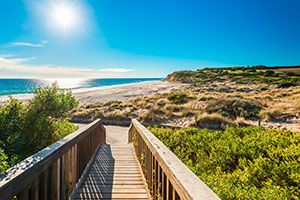11-Nights Classic Aussie Rail Spectacular

11-Nights Classic Aussie Rail Spectacular
Australia
Goway Travel
Vacation Offer ID 1501100
Reference this number when contacting our travel specialist.
Goway Travel
FIRST-CLASS | TAILOR-MADE: This 12-day adventure combines two of Australia’s famous rail journeys: The Indian Pacific and The Ghan. Starting in Sydney, you will travel through the best of South Australia before going on to Ayers Rock and the Great Barrier Reef. Explore the Australian outback and beyond aboard these luxury trains.Vacation Inclusions
- Private arrival and departure transfers in Adelaide
- Shared arrival and deprture transfers in Alice Springs, Ayers Rock and Cairns
- 2 nights first-class accommodation in Adelaide
- 1 night first-class accommodation on Kangaroo Island
- 1 night first-class accommodation in Alice Springs
- 2 nights first-class accommodation in Ayers Rock
- 3 nights first-class accommodation in Cairns
- Gold Service accommodation on the Ghan Train with all meals and drinks
- Gold Service accommodation on the Indian Pacific with all meals and drinks
- Shared overnight touring on Kangaroo Island
- Shared transfer from Alice Springs to Ayers Rock
- Shared Field of Light experience
- Shared Uluru and Kata Tjuta Sunrise tour
- Shared Sounds of Silence Dining experience
- Shared Outer Barrier Reef Cruise
- Shared Kuranda tour with Trail and Skyrail
- 2 breakfasts, 5 lunches, 3 dinners
Featured Destinations
| Kuranda | |
| Uluru | Destination Guide |
| Cairns | Destination Guide |
| Ayers Rock | Destination Guide |
| Alice Springs | Destination Guide |
| Adelaide | Destination Guide |
| Kangaroo Island | Destination Guide |
Valid Date Ranges
Standard Terms & Conditions apply when purchasing this trip. Special savings cannot be combined with any other offer. Airfare available for better packaging and pricing. Ask your travel advisor for details. All prices are per person and quoted in U.S. dollars. Single supplement applies. Blackout dates/seasonal supplements may apply. Accommodations, inclusions and itinerary subject to change depending upon specific departure date. From pricing is based on lowest marketed price for this tour, rates vary by date of departure; please inquire for details for your preferred travel dates. Inquire for a list of exclusions. Departures: From Sydney on Wednesdays.
All fares are quoted in US Dollars.





